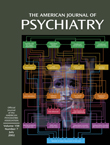Elevation of the Cortisol-Dehydroepiandrosterone Ratio in Drug-Free Depressed Patients
Abstract
OBJECTIVE: Elevated basal cortisol levels are a feature of depressive illness and cause deficits in learning and memory. The adrenal steroid dehydroepiandrosterone (DHEA) has antiglucocorticoid properties that may offer protection against the deleterious effects of cortisol. The authors examined the ratio of cortisol to DHEA in drug-free depressed patients and a matched comparison group. METHOD: Cortisol and DHEA were measured in saliva samples from 39 patients with unipolar depression who had been medication free for at least 6 weeks and 41 healthy comparison subjects. RESULTS: The molar cortisol-DHEA ratio was significantly higher in the depressed patients than in the healthy comparison subjects. Cortisol-DHEA ratios from saliva samples taken at 8:00 p.m. correlated positively with length of current depressive episode. CONCLUSIONS: Elevated cortisol-DHEA ratios may be a state marker of depressive illness and may contribute to the associated deficits in learning and memory. Administration of DHEA or other antiglucocorticoid treatments may reduce neurocognitive deficits in major depression.



